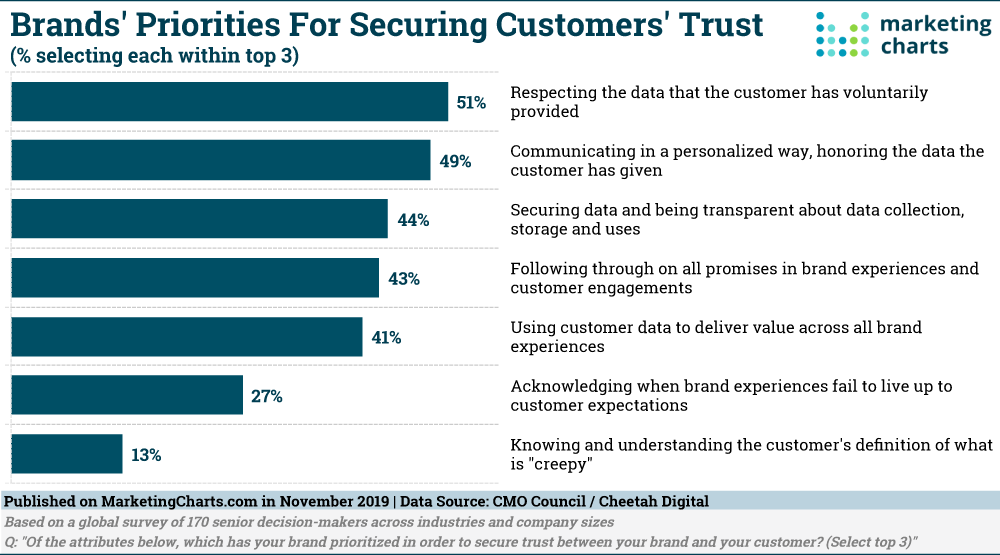Brand loyalty is no longer just about good prices or good quality. Brand trust is playing an increasingly important role. In research by Accenture, two-thirds of people (66%) say they are attracted to brands because a brand “does what it says it will do and delivers on its promise.”
In research by CMO Council and Cheetah Digital, 24% of CMOs define customer loyalty as “establishing a level of trust and connection that inextricably ties long-standing customers with the culture and attributes of the brand.” This is second only to repeat purchases.
What attributes do brands prioritize for securing consumer trust? Topping the list are:
- Respecting the data that the customer has voluntarily provided (51%)
- Communicating in a personalized way, honoring the data the customer has given (49%)
- Securing data and being transparent about data collection, storage and uses (44%)

When asked “what attracts you to buy from certain brands over others (beyond price and quality)?”, the Accenture research revealed:
- 66% – The brand has a great culture—it does what it says it will do and delivers on its promises
- 66% – The company is transparent—with where it sources its materials, how it treats employees fairly, etc.
- 65% – The company treats its employees well
- 62% – They believe in reducing plastics and improving the environment
- 62% – The brand has ethical values and demonstrates authenticity in everything it does
- 62% – The brand is passionate about the products and services it sells
- 52% – The brand stands for something bigger than just the products and services it sells, which aligns with my personal values
- 50% – They stand up for societal and cultural issues they believe in
- 50% – The brand supports and acts upon causes we have in common (e.g. social, charitable)
- 38% – The brand connects me to others like me and gives me a sense of community
- 37% – The brand takes a political stance on issues close to my heart
Check out some of these great examples of companies giving back.
- Bombas
For every pair of socks purchased, Bombas donates a specially-designed pair to a homeless shelter. It has donated more than 11 million pairs to over 1,700 giving partners in the US. - Patagonia
Since 1985, Patagonia has donated $89 million to hundreds of grassroots environmental groups. It also donates to nonprofits through its Employee Charity Match program, invests in socially and environmentally minded companies through its own venture capital fund, and donates new and used clothing. - Yoobi
Yoobi partners with the Kids In Need Foundation to donate a school supply to a classroom every time you buy one of its products. - Ikea
Ikea is committed to employing refugees at production centers in Jordan. This effort is part of the company’s long-term goal to employ some 200,000 disadvantaged people around the world. - Salesforce
Salesforce matches employee donations up to $5,000 and gives each employee seven paid days off a year to serve. Its top 100 volunteers get a generous added bonus: $10,000 to donate to a nonprofit of their choice.
Ethical Use of Consumer Data
In addition to corporate giving, ethical use of personal data was also a big factor in how consumers perceive brands. With three in five consumers saying they believe the data they provide is being used for personalization, brands must be extra diligent in protecting and responsibility using the data that consumers provide.
In research by Factual, 52% of respondents are comfortable sharing data with brands if hey know how the data will be used and the benefits of sharing the data. In another study by DMA, 54% of consumers believe trust in an organization is the most important factor influencing their willingness to share personal data. This means transparency must be at the forefront of all brand-consumer interactions in order to build trust-based relationships.
Opportunity for Improvement
Overall, only 34% of consumers say they trust most of the brands they use. And once a brand breaks a consumer’s trust by displaying unethical behavioral or a controversy, 45% of consumers said that the brand would never be able to regain their trust while 40 % said they would stop buying from the brand altogether. (source)
However, on the flip side, 81% of consumers say that trust in brands is an important part of their purchase behavior. This is a huge opportunity for brands to gain more loyal brand advocates by implementing strategies that address the issues important to today’s consumers.





